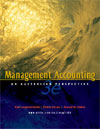 |  Management Accounting: An Australian Perspective, 3/e Kim Langfield-Smith,
Monash University
Helen Thorne,
University of South Australia
Preface
One of the major difficulties in writing this book was to capture current thinking and practice in management accounting, which is in a continual state of change. Unlike the financial accounting area, there are no accounting standards or legally enforceable practices, and no widely-publicised debate over appropriate accounting practice that we can access. Management accounting takes place within organisations and can be quite specific to each business. Also, to understand the nature of management accounting practice we need to understand the broader aspects of business practice, in areas such as marketing, strategy, human resource management and organisational behaviour. Management accounting both draws on, and contributes to these areas.
Our approach in presenting management accounting to students and managers is to focus on cutting-edge management accounting as practiced by leading organisations in Australia and overseas, while at the same time acknowledging that some firms are still satisfied to focus primarily on more conventional approaches to management accounting.
Since we began the first edition of this book, ten years ago, there have been dramatic changes in thinking about the role of management accounting in organisations. In the early 1990s it was sufficient to describe management accounting as being concerned with providing information for planning and control and for decision making. However, as you will see in this third edition, the role of management accounting has matured, so that it is now concerned with the processes and technologies that focus on the effective use of organisational resources, to support managers in their tasks of enhancing both customer value and shareholder value.
The processes and technologies of management accounting that enhance shareholder and customer value are also evolving over time. To understand how to design and implement contemporary cost management techniques or performance measurement systems requires an intimate knowledge of the nature of the business, its markets, its strategy and its people. Over the decades the practice of management accounting has broadened to become more a part of the process of management, and less part of the practice of accounting.
This book has been written primarily as a text for a one-semester undergraduate management accounting course. With some additional reading it can also be used for a two-semester course in management accounting. The references at the end of each chapter, and the associated web material provide guidance on additional readings. With its description of current practice and strong emphasis on the new developments in management and management accounting, this book also provides a sound foundation for a management accounting unit within an MBA course.
The origins of Management Accounting: An Australian Perspective can be traced to the US text, Managerial Accounting, by Ronald Hilton. However, there are significant differences between the two books. The Australian perspective has been developed using major cases based on real Australian businesses and includes numerous illustrations of the current management and management accounting practices of Australian organisations. Also, the Australian perspective focuses on the rapidly changing business environment both in Australia and globally, and includes several new chapters describing leading-edge developments in management and management accounting practice. All of the chapters that deal with conventional management accounting concepts and techniques have also been revised extensively to help students understand and evaluate their role in the modern business context.
We sincerely welcome any comments or suggestions from the lecturers and students who use this text. We can be contacted by e-mail: kim.langfield-smith@buseco.monash.edu.au or helen.thorne@unisa.edu.au.
Kim Langfield-Smith
Helen Thorne |
|



 2002 McGraw-Hill Higher Education
2002 McGraw-Hill Higher Education

 2002 McGraw-Hill Higher Education
2002 McGraw-Hill Higher Education